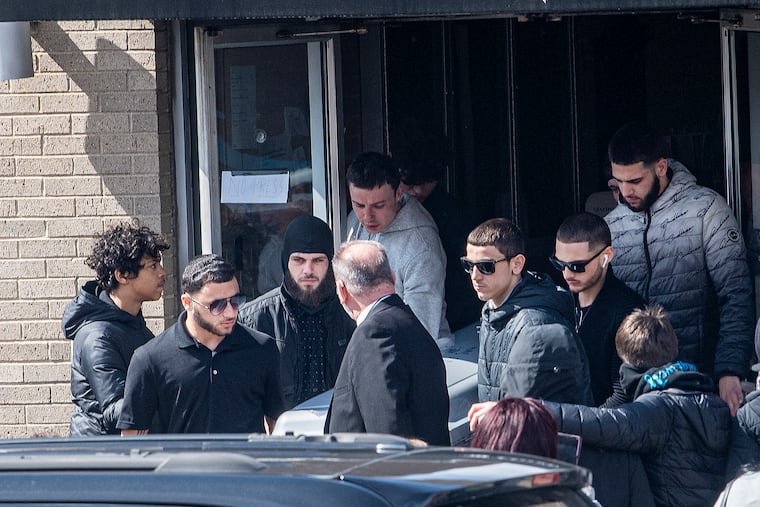It’s not enough to say ‘society failed’ when a child is killed by police | Helen Ubiñas
By saying "society failed" TJ Siderio, Philly's leaders are abdicating their responsibility to prevent future killings.

It’s been two weeks since Philadelphia police fatally shot a 12-year-old boy in the back, and we’re still trying to understand what happened to Thomas “TJ” Siderio that Tuesday night on a dark South Philly street.
I’m also struggling to understand what happened to TJ on all the other nights that came before it.
As with his death, information about TJ’s life has been hard to come by. News articles have begun to shed some light on what relatives said was an upbringing marked by challenges.
TJ’s father, Thomas Siderio Sr., 28, has been in prison for the last three years on firearms convictions and has at least two more years to go. TJ’s mother, Desirae Frame, has also been engaged with the criminal justice system. She released a statement calling for police reforms in the wake of her son’s death.
TJ also spent time in the child welfare system. Erica Smith, who said she was a foster mother to TJ when he lived with her for six months, told NBC: “I feel like I failed him.”
And there’s this from a GoFundMe page set up by a family friend that seems to speak to a life in turmoil: “The death of a child is not only devastating but it is a tragedy no matter what the situation. These grandparents must now say goodbye to their only grandchild the grandchild they could not save.”
Even with those threads of detail from TJ’s brief life, it’s unclear what was done, or not done, at ground level to try and save him. There’s still a lot that we don’t know — and might never know.
In this sickening incident, there is plenty of blame to go around — especially for the police officer who fatally shot a kid in the back as he was running away. The four undercover officers involved in the shooting of TJ on March 1 weren’t wearing body cameras — absolutely inexcusable in a department as large as Philadelphia’s. Despite the lack of cameras, we have evidence from video and audio recordings obtained by The Inquirer, which show that the gun police said TJ used to shoot into an unmarked police car, injuring one officer, was found about 60 feet away from where he was fatally shot in the back.
This gets at another key failure in this case.
“It’s tragic that a 12-year-old had access to a gun,” Philadelphia Police Commissioner Danielle Outlaw said in a news conference about the case last week. “It’s tragic that we have trigger-pullers as young as 12. And it’s tragic that we had one of our own go against everything that we say we are.”
Outlaw’s comments were a telling rebuke of her officer’s actions, which she said were in clear violation of the department’s own use-of-force policy. The guidelines state that officers should not shoot at a fleeing suspect “who presents no immediate threat of death or serious bodily injury.”
The police commissioner acted appropriately by making it clear that the officer would be fired. Outlaw’s quick acknowledgment of the department’s failings is a marked change from the code of silence that has hampered too many attempts to hold police accountable. (Whether that accountability sticks is a different story.)
But it is time for the police and so many others to do more — to move from acknowledgment to action. Because it is clear that TJ slipped through the safety nets set up to protect children.
Or, as Outlaw put it: “We as a society have failed him and so many other young people like him.”
She’s not wrong. I’ve said as much multiple times in the past. We all play a part in caring for one another, especially our most vulnerable.
But some of us have the power to do more than make grand statements that ultimately end up being little more than good soundbites, a quick way to disperse the blame and shrug off society’s woes.
Outlaw took an important first step by laying the groundwork for the dismissal of the officer who killed TJ — even if we know that is hardly the end of the story. Too many bad cops in this city get fired, only to eventually be rehired.
Now, Outlaw has to make sure that her officers are better equipped to follow the department’s own policies, and that — even amid the most stressful moments of their jobs — they use common sense. There are conflicting accounts about what police said occurred, but one detail in virtually every version of the story hasn’t been disputed: TJ was running away from officers when one of them chased him down and shot him in the back.
This falls at the feet of Mayor Jim Kenney, too. There have been reports that the city hasn’t been following through on grants it has promised to community groups working on anti-violence initiatives. As a result, activists have been forced to spend their own money.
And District Attorney Larry Krasner has to do a lot more to get gun cases prosecuted — he simply can’t keep blaming that failure on witnesses who are not willing to come forward.
And that’s not all. After months of delays, the city has yet to release any evaluations of the kind of anti-violence programs that might have helped TJ and so many others. I’ve been screaming about those long-overdue evaluations for years.
We must acknowledge our failings as a society, and as a city. But acknowledgment isn’t action or ownership.
Acknowledgment without action just gives those with the most power to protect children a shield to protect themselves from their own failures — until the next child is lost.